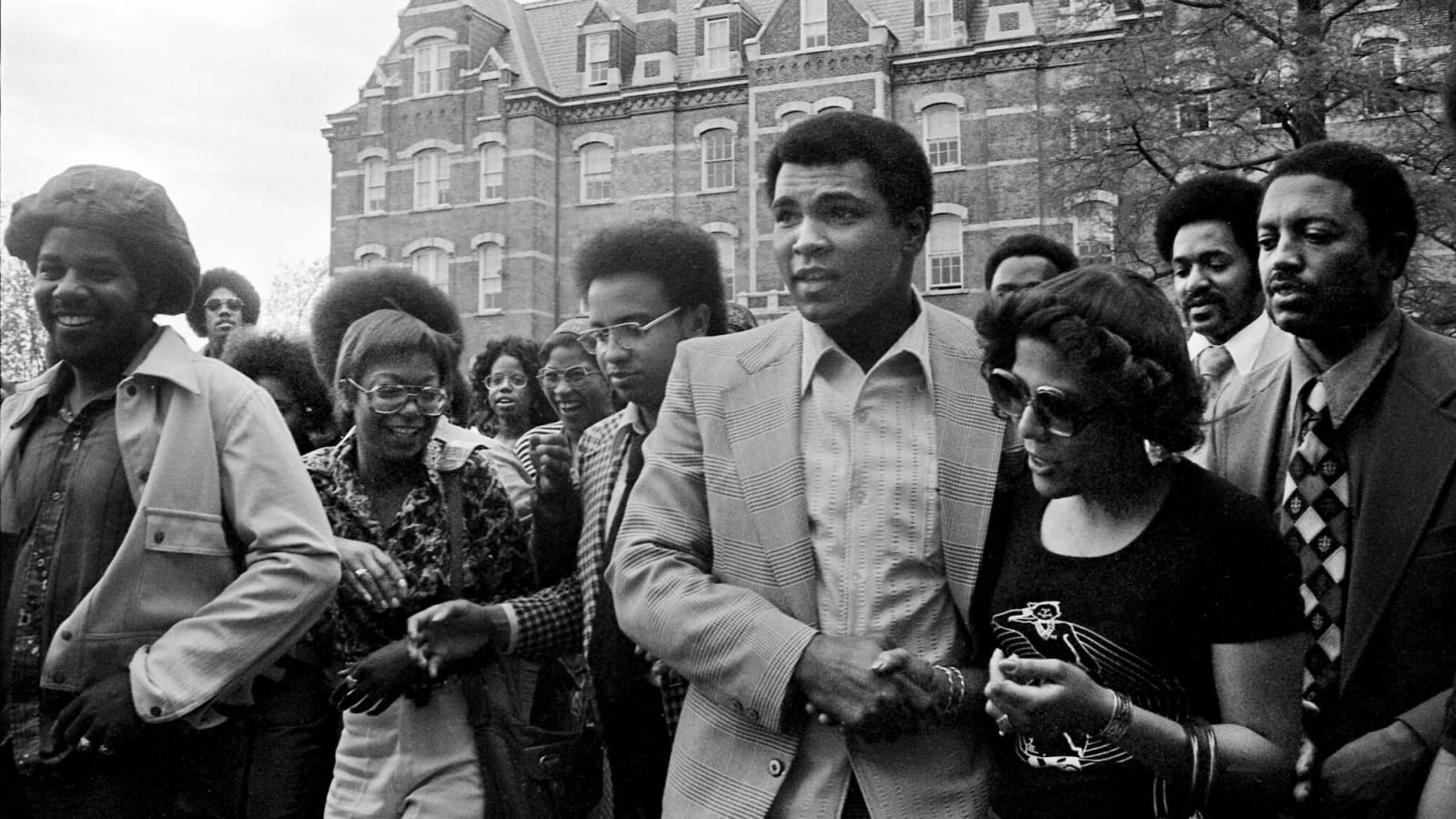
“Impossible is just a word thrown around by small men who find it easier to live in the world they’ve been given than to explore the power they have to change it.”–Muhammad Ali
Muhammad Ali (56-5, 37 KOs) will go down in boxing history as one of the greatest fighters to ever set foot inside the ring. A name synonymous with the sport itself, Ali would have turned 82 today. It’s been almost eight years since his passing, and today, we celebrate a few iconic snippets from the life of the boxer who made boxing a household name.
Humble beginnings
Ali was born Cassius Marcellus Clay Jr. on January 17, 1942, in Louisville, Kentucky. His father, Cassius Marcellus Clay Sr., painted signs and billboards for a living, while his mother, Odessa O’Grady Clay, was a domestic helper.
The older of two children, he grew up amid racial segregation.
“We were downtown at a 5-and-10-cents store. He wanted a drink of water, and they wouldn’t give him one because of his color. And that really affected him. He didn’t like that at all, being a child and thirsty. He started crying,” his mother recalled while discussing a pivotal moment in the champ’s life.
Ali took up boxing at the age of 12 after his bike was stolen. He trained under a former Louisville policeman named Joe Martin and quickly rose up the amateur ranks. Ali went on to win the gold medal in boxing at the 1960 Olympics in Rome. He also made his professional debut that same year.
Float like a butterfly
Ali’s first professional bout was against Tunney Hunsaker (17-15-1, 8 KOs), who he scored a decision win against.
The champ’s slew of victories quickly paved the way for his heavyweight title shot against Sonny Liston (50-4, 39 KOs). A few weeks before the fight, Ali’s father revealed to the Miami Herald that his son had joined Elijah Muhammad’s Nation of Islam. This announcement caused a furor among the promoters, who threatened to cancel the fight unless Ali (then Clay) publicly disavowed the organization.
A compromise was reached when Ali’s friend and the organization’s spokesperson, Malcolm X, agreed to keep a low profile until fight night.
While Liston tried to start strong, he quickly found himself challenged by Ali’s nimble footwork and pugilistic prowess. Liston had suffered considerable damage to his left shoulder by the end of the sixth round, which led to his team stopping the fight.
Ali was declared the new heavyweight champion after winning the WBA, WBC, NYSAC, and The Ring Magazine heavyweight titles.
Ali met Liston for their rematch in Lewiston, Maine, on May 25, 1965. This controversial fight cemented his name as a Titan in boxing.
Barely minutes into the first round, Ali floored Liston with a brutal punch that shook the boxing world. Many in attendance swore they did not see the move that famously earned it the moniker, ‘The Phantom Punch’.
On this night in 1965, Ali leveled Liston and an iconic photo forever immortalized the moment. (via John Rooney/AP) pic.twitter.com/olZpMHagOP
— ESPN (@espn) May 26, 2016
Ali further went on to taunt the fallen Liston—a moment which was immortalized as one of the greatest boxing photographs of all time.
“That shot shivered Liston. He blinked his eyes three times, like he was trying to clear his head, and I looked at Willie Reddish. I could see Reddish looked sick because he knew his fighter was in trouble,” trainer Chickie Ferrera said while talking about Ali’s win.
Ali also had many other memorable fights, including the 1974 showdown against George Foreman (76-5, 68 KOs) and the Leon Spinks (26-17-3, 14 KOs) fight in 1978.
Sting like a bee
‘The Greatest’ was an athlete who knew that his voice and opinions held weight. Ali’s impact on the Civil Rights Movement was unparalleled. His power as a heroic symbol became quintessential to the movement’s ideological spectrum. Ali was conscientiously against the Vietnam War. He even refused to be drafted into the United States Army, stating that he “ain’t got no quarrel with them Viet Cong.”
Post his retirement, he spent most of his time in philanthropic work. Ali supported the Special Olympics and the Make-A-Wish Foundation, among other organizations, and also traveled to multiple developing nations to offer support. In 1998, he was chosen to be a United Nations Messenger of Peace because of his work.
As one of the most skilled boxers of his time, Ali was a major inspiration for many upcoming boxers.
“I talk that sh*t, but he’s the real deal. Ali’s a giant. There is no way other fighters can match him. He’ll die for this sh*t. He’ll die. I’m not gonna die for this,” said former heavyweight champion Mike Tyson (50-6-2, 44 KOs). “That’s real talk. Ali’s a savage. He’s an animal. A different breed of person. He’s not like us.”
Ali might have bid adieu to the world, but he will forever live, for years to come, in the hearts of boxing fans across the globe.
More must-reads:
- Bradley Beal is adamant about one thing after Suns fall behind 3-0
- Controversial CB could be eyeing return to Steelers
- The '100 catches in an NFL season' quiz
Breaking News
Customize Your Newsletter
 +
+
Get the latest news and rumors, customized to your favorite sports and teams. Emailed daily. Always free!

